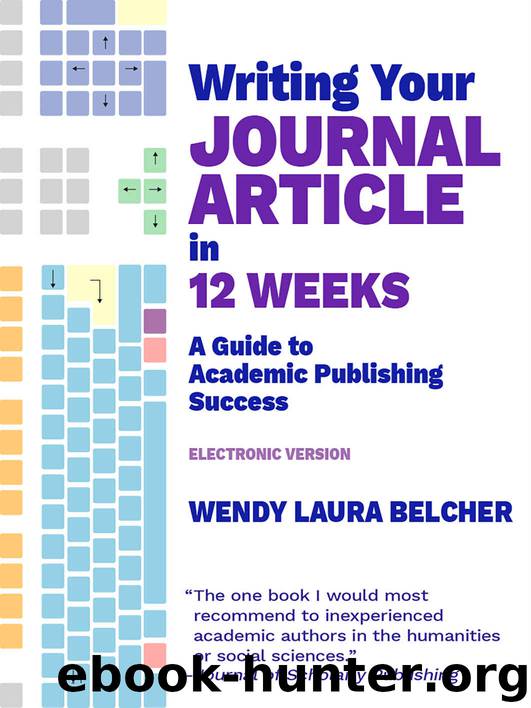Writing Your Journal Article in Twelve Weeks: A Guide to Academic Publishing Success (electronic version) by Wendy Laura Belcher

Author:Wendy Laura Belcher [Belcher, Wendy Laura]
Language: eng
Format: epub
Tags: journal articles, peer-reviewed journals, scholarly writing, writing articles, graduate student writing, junior faculty writing, journal article writing, academic article writing, humanities journal articles, social science journal articles
Publisher: Wendy Laura Belcher
Published: 2016-03-01T08:00:00+00:00
Common Mistakes in Citing the Literature
Don’t cite one source too much. If you cite one article or book throughout your article, or repeatedly in reference to your argument, peer reviewers may suspect that your work is derivative. Don’t depend on one secondary source for more than one or two paragraphs at most. Most published articles have twenty to a hundred citations to contextual, methodological, theoretical, and related literature. For instance, a scholar studying disciplinary variation found that the average sociology article included 104 citations while the average philosophy article included 85 (Hyland 2004, 24). If a particular text is your original literature, or the primary source you are studying, you can, of course, reference it repeatedly, but if you cite any other kind of text repeatedly, you will need to make clear that you are not depending on it for the majority of your data or argument.
Don’t cite irrelevant literature. If you cite literature that isn’t directly related to your topic, peer reviewers can dismiss your article as digressive. For instance, if you are analyzing an educational experiment in which undergraduates do real field research, do not spend half the article discussing various theories of field research.
Don’t overcite definitions. Classroom essays can devote pages to scholars’ definition of various terms. Publishable articles don’t. It takes a sentence and maybe a footnote to define most terms. Few articles are published that simply dispute other scholars’ definitions.
Don’t misattribute. If you attribute general beliefs or entire systems of thought to one person, peer reviewers can dismiss your article as unscholarly. For instance, you cannot state in passing that “Howard Winant discovered that race is a socially constructed phenomenon.” Thousands have argued for the social construction of identity. At most you could write, “Sociologists since Durkheim have argued that social interaction makes reality; Howard Winant was instrumental in calling attention to the constructed nature of race.”
Don’t cite the citation. If you cite a scholar’s articulation of another scholar’s idea, peer reviewers can dismiss your article as unscholarly. That is, don’t state, “I am using John Doe’s definition of globalization” when Doe is using Arjun Appadurai’s definition of globalization. Take the time to find the original definition or articulation of an idea and cite it. Likewise, if Brian Edwards (2007) discusses “what Edward Said called ‘traveling theory,’ ”don’t cite Edwards on “traveling theory,” cite Said. Just because you found out in Edwards’ article that this idea belongs to Said, doesn’t mean you have to cite Edwards. It means you must read and cite Said.
Don’t cite asides. If you cite as related literature those articles that don’t fully address the debate you are engaging in, peer reviewers can dismiss your article as unscholarly. For instance, several articles have been written about “the age of circulation.” Don’t cite an article for this theory that has only a sentence or two on “the age of circulation.” Students who have only read assigned reading for the classroom often make the mistake of using only what has been assigned. Take the time to find articles and books that are devoted to the topic.
Download
This site does not store any files on its server. We only index and link to content provided by other sites. Please contact the content providers to delete copyright contents if any and email us, we'll remove relevant links or contents immediately.
Asking the Right Questions: A Guide to Critical Thinking by M. Neil Browne & Stuart M. Keeley(5775)
Autoboyography by Christina Lauren(5235)
Eat That Frog! by Brian Tracy(4540)
Dialogue by Robert McKee(4404)
Sticky Fingers by Joe Hagan(4198)
Journeys Out of the Body by Robert Monroe(3624)
Annapurna by Maurice Herzog(3467)
Full Circle by Michael Palin(3450)
Schaum's Quick Guide to Writing Great Short Stories by Margaret Lucke(3381)
Elements of Style 2017 by Richard De A'Morelli(3350)
The Art of Dramatic Writing: Its Basis in the Creative Interpretation of Human Motives by Egri Lajos(3067)
Atlas Obscura by Joshua Foer(2962)
Why I Write by George Orwell(2954)
The Fight by Norman Mailer(2940)
The Diviners by Libba Bray(2938)
In Patagonia by Bruce Chatwin(2930)
The Mental Game of Writing: How to Overcome Obstacles, Stay Creative and Productive, and Free Your Mind for Success by James Scott Bell(2908)
Venice by Jan Morris(2573)
The Elements of Style by William Strunk and E. B. White(2473)
